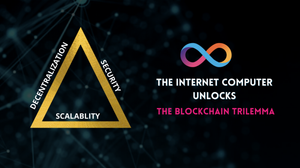“The Blockchain Trilemma” was first mentioned by Vitalik Buterin in his paper on Ethereum. It’s a concept about the challenges in creating a blockchain that is built on all three key parameters — scalability, decentralization, and security, without compromising on any facet. It is a general belief that blockchains cannot achieve all three and are forced to make tradeoffs.
A new independent study by Coincodex compares six top Layer1 blockchains on various aspects like Node Counts, Cloud Service Dependency, End-User Key management, and others. This makes it easy to analyze how each blockchain fares on the three elements of the trilemma. Let’s look at each aspect of them with inputs from the study.
Decentralization

The number of blockchain nodes and their distribution is a robust indicator of a network’s relative decentralization. It is essential to look at these aspects because, while blockchains like Ethereum and Solana have many nodes, they are primarily run on centralized cloud service providers like AWS. In contrast, others like Cardano & Avalanche are not transparent about their node distribution.
Internet Computer is the only blockchain today that runs on independent data centers, making its 443 nodes truly decentralized—the only one in this study to be able to claim this.
A related topic is cost and because the cost of storing smart contract data on-chain can be exorbitantly high, most dApps typically rely on centralized servers and cloud providers such as AWS, Google Cloud, Microsoft Azure, and Alibaba Cloud to store data and host their client-server interfaces.
ICP offers storage costs to dApps at as low as 5$ / GB compared to the likes of $73,000,000 / GB for Ethereum and $1,000,000 / GB for Solana.
Scalability

Blockchains are scalable when they support high transaction throughput and can grow to accommodate new users. A scalable blockchain is one where network traffic doesn’t significantly hamper overall performance.
It’s commonly acknowledged that Ethereum Proof-of-Work (PoW) consensus protocol is not scalable, and while there are plans to migrate to Proof-of-Stake(PoS) consensus, the impact is still to be seen. Cardano faces a similar issue. Solana suffered from a significant “resource exhaustion” in 2021 and six outages this past January, demonstrating its limited scalability. Algorand has innovated using Pure Proof-of-Stake, which works slightly better than the others.
Internet Computer offers Indefinite Scalability. Internet Computer’s infrastructure has independent node machines at the base layer that combine to form standalone subnet blockchains. Each subnet can process update/query calls without relying on other subnets, allowing the network to scale as needed.
Security

Two things determine the security of a blockchain — inter-chain bridges used to transfer data packets and digital assets between two separate chains and End-User Key Management — complex private keys to set up a crypto wallet to access the platforms.
Hackers have stolen more than $1 billion in cryptocurrency over the past year across seven incidents, according to research by Chainalysis, mainly due to bridge hacks, the big one being the $320 million hack from Wormhole, the Solana Bride.
The Internet Computer supports bridge-less inter-chain integrations, relying solely on the trustless properties of the blockchains. It is also using other safe bridges & API’s to integrate with the Bitcoin & Ethereum netwroks.
When it comes to End-User Key management, for most Web3 dApps, users have to use complex private keys and set up a crypto wallet to access the platforms. Most of them rely on centralized corporations like AWS or Google to store keys and manage accounts.
On Internet Computer, users can set up an Internet Identity locally, using their mobile devices’ fingerprint sensor, facial recognition, security pin, lock pattern, and so on. The Internet Identity helps users authenticate themselves anonymously, without worrying about private keys.
The details provided by Coincodex clearly imply that DFINITY Foundation’s Internet Computer Protocol (ICP) is the only blockchain that is solving “The Blockchain Trilemma.” With 1000’s of dApps being developed on it for Defi, NFTs, Social, Gaming, Metaverses & more, the benefits promised by the eco-system will soon be visible to users.
Connect With Us:
Twitter | Telegram | Instagram | Facebook | Email

- Disclaimer: The views and opinions expressed on this website are solely those of the original author and other contributors. These views and opinions do not necessarily represent those of the Dfinity Community staff and/or any/all contributors to this site.


Comments are for members only. Join the conversation by subscribing 👇.